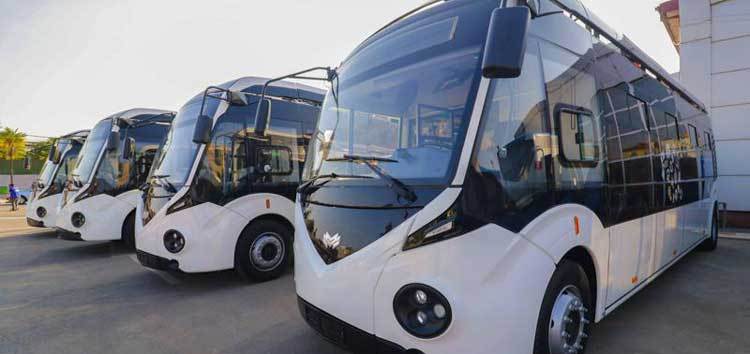Electric buses for a greener Batumi

Reforming Batumi’s public transport
The arrival of 8 electric buses in Batumi is a new milestone for the EBRD. The seaside resort, the second largest city in Georgia with a 170,000-strong population, is a pioneering member of EBRD Green Cities. It is the first city in any of the Bank’s countries of operations to receive financing for electric buses in a municipal fleet, by far the cleanest vehicles available for urban bus operations. This is a pilot project that has greatly benefited from the support of the EBRD-managed multi-donor Eastern Europe Energy Efficiency and Environment Partnership (E5P) Fund, of which the European Union (EU) is the largest contributor. E5P has been active in providing grants to majority Green Cities projects in the Eastern Partnership countries. Without doubt, this project helps to bring Georgia closer to its aspirations towards European values.
“Modern Buses for Modern Batumi” reads the slogan above the logos of the EBRD, E5P and the EU, imbedded on the side doors of these white, futuristic, battery-run electric vehicles that were delivered in Batumi in October 2020.
In the “good old days”, this occasion would deserve a proper ribbon-cutting ceremony. The EBRD, jointly with the Batumi Mayor’s office, would organise a huge, lively event in the city centre, inviting journalists, speakers from the government and donor states, other guests and members of the public to take a ride on these soundless “green” electric buses. Alas, being in the midst of the worst pandemic of the century, we had to be content with numerous glorifying articles and Tweets with nice pictures of these futuristic-looking vehicles. Next summer, perhaps...
The efforts to rehabilitate Batumi’s public transport infrastructure have been in the making for over a decade. Combining the teams’ efforts of intense policy dialogue with the authorities, securing funding from the donors and the hard work of colleagues, both in the Regional Office (RO) and Sustainable Infrastructure Group (SIG), helped to transform Batumi’s public transport infrastructure to the modern standards of a European city.
It all started in 2008 when the EBRD extended €2.5 million to the City of Batumi to purchase 78 mid-sized diesel buses and maintenance equipment. An additional number of soft measures were also implemented successfully, that helped to improve and modernise the operations of the public transport. These are: the introduction of the ticketing system; improved financial reporting and operations management; raising the bus-operating company’s management capacity, as a motivation for further development. The company introduced a GPS system for controlling buses and placed information on bus schedules and routes on the website. Since July 2012 the innovative use of electronic boards at bus stops, indicating the time left before the next bus arrives, became the norm.
In 2017 the Bank extended an additional €5.5 million sovereign loan, including an E5P grant of €1.5 million, to Georgia to be on-lent to the City of Batumi for the benefit of the Batumi Autotransport, a municipal bus company, to acquire the eight battery-electric buses and 40 new buses with Euro V engines.
Apart from the environmental benefits, these low-floor buses also bring significant social benefits, helping to facilitate easier access for passengers with prams and shopping bags, especially women, and those with limited mobility, including the elderly and disabled travellers.
The project also acted as a trigger investment allowing Batumi to join the EBRD’s Green Cities. €0.8 million in technical cooperation funds were provided to assist the development of a Green Cities Action Plan (GCAP) for Batumi that started at the beginning of 2019 and was approved last month. The GCAP has identified a whole range of green urban infrastructure projects for future investment, including more urban transport, water, solid waste management and building energy efficiency.
Eight buses may be a small step, but it is a large leap for a mid-sized city. It plays a big role in the lives of urban residents by cutting air pollution, as well as reducing toxic air emissions. It helps to educate the local residents to think more about energy waste and helps to promote the ideology of the “greener” city. It gives hope that an innovative and successfully implemented pilot project, will lead to the Bank investing more in electric bus technology across many cities.
The EBRD has a compelling ambition towards climate change mitigation. This project also helps the Bank to be one-step closer to its objective of scaling up green finance, as reflected in the GET and its successor GET 2.1, making a small but significant contribution to the accomplishment of the Bank’s recently approved Strategic and Capital Framework.
Article by Loretta Martikian, EBRD